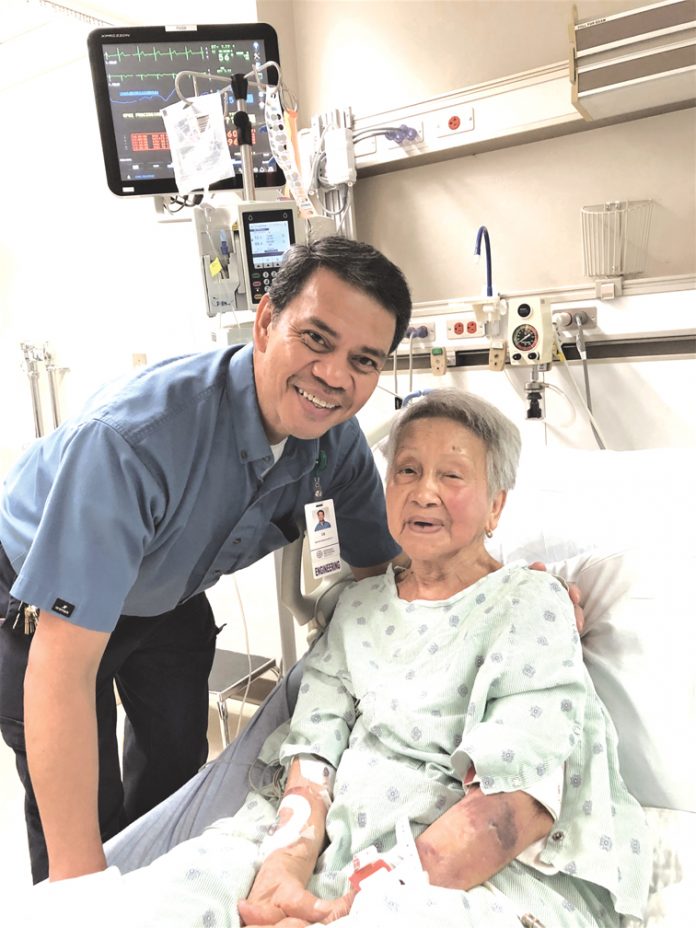
by Bobby Anderson,
Staff Writer
Most at Norman Regional Health System know Eugene Brown. The Engineering Services employee usually shows up shortly after getting a call that a piece of equipment isn’t working quite right.
But few at NRH know his mother, 91-year-old Felicidad S. Jones. That didn’t stop them from coming to her aid during the family’s time of need.
Twenty-two people gave blood in honor of Jones during the hospital’s most recent blood drive.
At the blood drive, donors had the choice to dedicate their donation to Jose, who was in need of platelets.
On May 14, Jose wasn’t feeling well and had some chest pain so she was taken to Norman Regional HealthPlex’s Emergency Department. They found her platelets to be dangerously low, somewhere near the 5,000s when normal range starts at 150,000.
She was transferred to Norman Regional Hospital to be admitted and begin receiving platelets.
Brown, who is also a member of the health system’s Blood Drive Committee, contacted Trish Crow, co-chair of the committee, before the blood drive on May 22 to ask if they could tell donors of his mom’s story and ask if they’d like to give in her honor. Crow was happy to oblige.
“Norman Regional Blood Drive Committee is always happy to help our healers. The May blood drive was no exception,” Crow said. “Norman Regional healers know the significance of their donations; however, it was even more heartfelt to have a family member as a designee. Supporting each other and saving lives one donation at a time.”
Brown said his mother is completing follow up blood tests, but she’s home now and is doing well.
“She’s a very sweet lady and she has so much love to give. We’re trying to just enjoy our time with her,” he said. “I’m really thankful for Trish Crow and the Oklahoma Blood Institute. My family is blessed to have Norman Regional and all the people who work here. They are all truly caring and professional.”
Brown not only volunteers his time to the Blood Drive Committee, but gives blood as often as he can. He has been donating since February 1996 and has given 65 times. Through his donations, he has donated 23 gallons and saved 186 lives. He often gives double, which means he donates double the red cells than a regular whole blood donation. While giving the red blood cells, he receives back his plasma, white blood cells and platelets. Double donations take longer than regular donations, and someone who donates double is not eligible to donate for 112 days rather than 56 days. There are height and weight requirements to donate double.
“I know people need blood and I always try to give because I think, ‘you never know, one day you or your family may need it.’ Sure enough, my mom needs it now. I want to help people, and I know by donating at Norman Regional the blood will go directly to those in our health system who need it,” Brown said. “Giving blood and giving back to the health system and this community is my obligation. I love Norman Regional, I love this community, and I know they are always there for my family and me.” “I’m blessed to be here and my family is grateful for Norman Regional helping my mom.”
According to the Oklahoma Blood Institute, every two seconds, someone needs blood, yet less than 10 percent of those eligible donate.
Blood donors with Oklahoma Blood Institute know they are, literally, saving the lives of their friends, family and co-workers, some who may have no idea they will need blood in an urgent situation. One blood donation can save up to three peoples’ lives.
“Summer is a particularly challenging time for the blood supply,” said John Armitage, M.D., Oklahoma Blood Institute president and CEO. “People go out of town, and are busy with activities, and get out of their normal routine of giving blood. We encourage healthy adults to spare just an hour of their time to save the lives of their neighbors.”
Only ten percent of people in the United States who are eligible to give blood actually do. Blood donation takes just about an hour, and each donation can save the lives of up to three patients. Whole blood can be donated every 56 days. Platelet donations can be made as often as every 7 days, up to 24 times a year.













